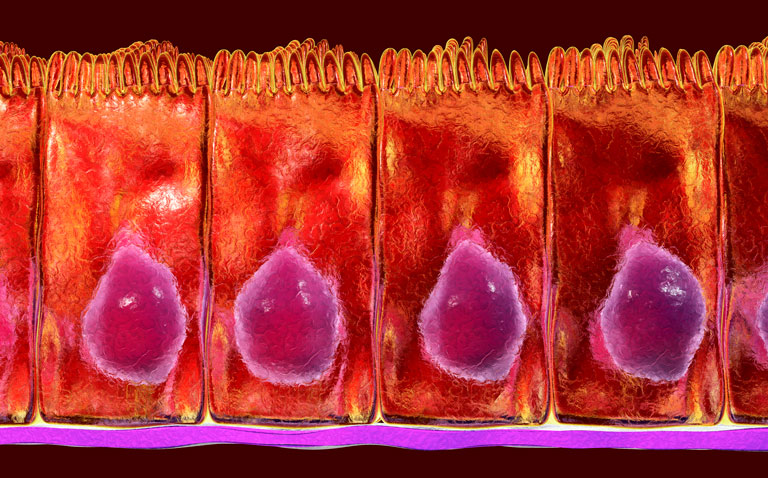A research team led by biomedical scientists at the University of California, Riverside, has found that a drug to treat rheumatoid arthritis and ulcerative colitis can repair permeability defects in the gut’s epithelium.
The study is the first to show the drug, tofacitinib (Xeljanz) has a direct effect on cells lining the gut by correcting defects that occur in inflammation. Until now, the effects of tofacitinib on intestinal epithelial cell functions were largely unknown.
“Our work increases our understanding of how this drug is useful for treating ulcerative colitis,” said Declan McCole, a professor of biomedical sciences in the UCR School of Medicine, and the lead author of the study that appears in the journal Inflammatory Bowel Diseases. “We now better understand where in the gut the drug is working, and how.”
McCole explained that increased intestinal permeability — or leakiness — is a feature of ulcerative colitis and plays a critical role in promoting inflammation. His team tested tofacitinib in human intestinal epithelial cell lines, as well as in organoids, or colonoids, that were derived from primary human colonic stem cells isolated from human subjects — primarily patients undergoing elective colonoscopy for colon cancer screening — and found tofacitinib repaired inflammation-induced permeability defects in both.
The epithelium is a thin layer that lines the alimentary canal. The gastrointestinal epithelium is comprised of cells that have gaps between them, making them selectively permeable and providing a barrier that keeps out pathogens, toxins, and antigens from entering the gut, while allowing the absorption of nutrients. In ulcerative colitis, this epithelial permeability becomes leaky, allowing bacterial products to cross into the gut and nutrients and water to leak out. This, in turn, triggers immune responses, resulting in fluid loss and diarrhea.
“We found tofacitinib fixes the leakiness in the intestinal barrier,” McCole said. “Specifically, it fixes intestinal epithelial permeability defects caused by ‘interferon-gamma,’ an inflammatory cytokine involved in autoimmune diseases such as ulcerative colitis and rheumatoid arthritis.”
“By targeting specific molecules, the drug inhibits a pathway that is activated by inflammation,” said Anica Sayoc-Becerra, a graduate student in the Biomedical Sciences Graduate Program, a member of McCole’s lab, and the first author of the research paper. “Our study shows tofacitinib is not just acting on immune cells, as was first thought, but can have a direct effect on the epithelial cells that are the key factor in maintaining gut barrier function.”










